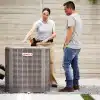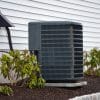Carbon monoxide (CO) can cause serious health issues or even death if inhaled excessively. It is hard to detect because it is colourless and odourless, which makes it even more dangerous.
HVAC systems can lead to CO exposure in both residential and commercial properties if left unchecked. You need to know the risks associated with your HVAC system, especially if it includes a boiler or furnace that is gas-powered.
We will discuss how neglected HVAC systems can lead to CO poisoning. We will also cover the symptoms and signs of CO poisoning.

How can your HVAC system cause CO poisoning?
The burning of fuels like gas, propane, and oil produces CO. These fuels are used to heat your house or business. If your HVAC system is not working properly, combustion gases could leak into your indoor environment and cause CO poisoning.
There are several ways your HVAC system could leak CO:
- Cracked heat exchangers in furnaces or boilers: Heat exchangers are metal chambers that separate combustion gases from the air blown through the conduits. The heat exchanger can crack and allow the gases to mix with the air, contaminating it with CO.
- Clogged furnace filter: The furnace filter traps dust and debris in the furnace’s air. Filter obstruction can cause the furnace to work harder and reduce airflow. This can lead to the heat exchanger cracking and overheating.
- A damaged or blocked vent pipe: The exhaust gases are carried from the furnace to the outside by the vent pipe. The gases can back up into your home if the vent pipe becomes blocked by snow, ice, and other debris.
- A poorly installed or malfunctioning flue: A flue regulates the flow of exhaust gases from the furnace, boiler, or vent pipe. The flue can be malfunctioning or poorly placed and allow gases to escape into your home rather than being vented outdoors.
What are the Signs and Symptoms Of CO Poisoning?
The symptoms of CO poisoning vary depending on how severe the exposure was. These are some of the most common symptoms:
- Headache
- Dizziness
- Nausea
- Fatigue
- Breathing difficulty
- Chest pain
- Loss of consciousness
These symptoms may be mistaken for flu symptoms or other illnesses. CO poisoning, however, does not cause nasal congestion or fever. CO poisoning can also affect multiple people in the home or office at once, unlike the flu, which usually only affects one person.
You should immediately report any suspicions that you or another person have been exposed to CO by calling the emergency line – 911.
How to Prevent CO Poisoning From Your HVAC System?
Here are the best possible ways you can prevent your HVAC system from exposing CO:
1. Regular maintenance
Maintaining your HVAC system properly and frequently is the best way to avoid CO poisoning. It also keeps your HVAC system more efficient and safe. So make sure that your HVAC system is maintained by a qualified HVAC services provider in your local area.
2. Install CO detectors

Installing CO detectors in the home or office is another recommendation. CO detectors alert you when high levels of carbon dioxide are detected in indoor air. They should be placed near your sleeping areas as well as on every floor of your building.
3. Have your Boiler/Furnace Inspected
At least once per year, have your boiler or furnace inspected by a professional. An HVAC technician will inspect your system for cracks, leaks, and malfunctions that could lead to CO leakage. To improve your system’s performance and efficiency, they can clean up and tune it.
4. Replace the HVAC air filter regularly
Keep your furnace clean and replace your furnace filter often. Depending on how frequently you use your furnace and how dusty the environment is, your furnace filter should be replaced every one to three months.
Another tip is that you need to avoid storing gasoline, paint, or other flammable materials near the furnace (less than 2 feet). This is to prevent obstructions and fire hazards.
Conclusion
Your HVAC system can lead to CO poisoning, which is potentially deadly and very serious. You can prevent it by following these tips and maintaining your HVAC system in top shape.
Installing CO detectors and having your system checked and serviced frequently, changing your furnace filter often are things that can help protect your family from Carbon Monoxide poisoning.



